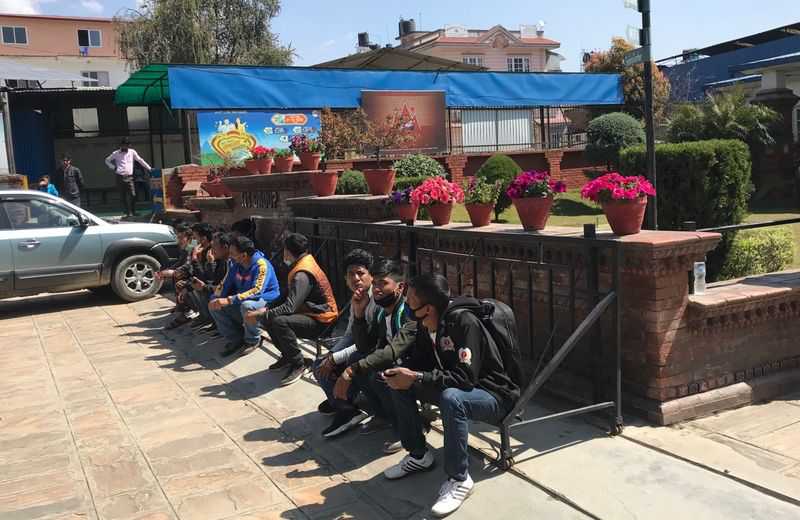Coronavirus travel bans hit migrant workers
26 March, 2020

Dinesh Bhandari spent several days vacationing by bus from his village in rural Nepal to Katmandu to obtain a permit to have up the factory task he had been promised in Malaysia.
When he reached the Nepali capital, he found the entranceway to the recruitment agency was locked. An email on it read: “No labor permits will be released by the federal government until further find because of the coronavirus.”
The 22-year-old is among a growing number of migrant employees hit by a wave of travel bans from Asia to the center East targeted at combating the virus.
“I am shocked. I don’t really know what to do nowadays,” explained Bhandari, who was simply promised just work at a Malaysian glove supplier on a once a month wage of nearly $300.
“I've no other strategies ... and I must send funds to my parents who have no other income source.”
About 1,500 Nepali migrants leave each day for the Middle East, Malaysia and South Korea to function mainly as household and construction workers, and remittances - the amount of money they send back - constitute in regards to a quarter of Nepal’s gross household product.
Remittances certainly are a crucial lifeline for family members in Nepal and other countries in your community, including Bangladesh and India, which currently have a lot more than 30 million persons in jobs overseas, in line with the International Labour Organization.
But travel restrictions targeted at slowing the propagate of coronavirus, which includes infected a lot more than 245,000 persons globally and killed a lot more than 10,000, threaten to leave millions of Southern Asian migrant laborers without work.
Nepal features suspended all permits for migrant personnel as part of a program of travel constraints that also pubs its citizens from getting into the united states from Europe, the center East and Japan until April 15.
Malaysia, where many South Asian workers go for jobs, offers shut its borders to travelers and restricted internal movement until March 31.
Qatar, which depends on about 2 million mainly Asian migrant staff for the majority of its labor force, offers banned foreigners from getting into the country until the end of this month and Saudi Arabia features suspended all international flights for two weeks.
For the thousands of families that rely upon remittances for everything from rent, institution tuition and transport to groceries and bills, the fallout will be harsh, explained Ganesh Gurung of the Nepal Institute of Development Research.
“Lower-middle-class families will grow poorer and poverty will rise,” he predicted.
In limbo
A lot more than 7.5 million Bangladeshis work outside the country, having to pay up to $8,500 to go abroad, the US says. Saudi Arabia may be the most popular vacation spot, according to government info.
Jahirul Islam, 30, has been in limbo because the Abu Dhabi sports academy where he worked shut down temporarily and his boss said he'd not be paid for at least 8 weeks, advising him to return to Bangladesh.
But with the Bangladeshi government in the center of March telling personnel to stay where they are and fears over whether his do the job visa will be renewed if he leaves, Islam is staying place.
With no wages, he is unable to send funds to his wife, brother and parents back home, and is also sense the pinch in the oil-rich capital of the United Arab Emirates.
“I am surviving on borrowed cash right now ... It’s an extremely sad circumstances,” he advised the Thomson Reuters Foundation by phone.
Bishnu Prasad Gaire, president of the Nepal Association of Foreign Occupation Agencies, said up to 43,000 Nepalis were promptly afflicted by the bans.
Some of those struggling to return home under the ban face scarce food materials and higher costs as demand spikes, said Yubraj Nepal of the Centre for Migration and International Relations.
“The federal government of Nepal should think in the type of citizens’ safety not merely in Nepal but also those who are working abroad,” he said.
A labor ministry spokesman said it was too early to assess the impact, however the authorities was monitoring the problem and focusing on possible relief measures.
No food, no passports
Despite money worries, the majority of families said their priority was the fitness of relatives employed in virus-affected countries.
“Hope he remains safe and doesn’t obtain the virus,” said Bangladeshi mom of 3 Rojina Akter, whose hubby works at a good ship recycling firm found in Singapore, where 266 persons have already been infected by the coronavirus.
In India, the groups of about 750 fishermen stranded in Iran - among the countries most detrimental hit by the epidemic - are demanding that the government bring them home.
The men have said the Gulf fishing organizations that hired them confiscated their passports and transferred them to the Iranian coast from the UAE.
Fishermen generally from southern India have traditionally migrated to Bahrain, Saudi Arabia and the UAE for lucrative careers on fishing vessels, but have quite often been accused by Iranian officials of trespassing.
And despite repeated assurances from Indian authorities, the men say they have already been remaining stranded and without foodstuff.
“As to why are we ignored? We've families too,” explained Shanu Mariyadasan, a fisherman from India’s coastal Kerala state. “Are we supposed to die here?”
Source: the-japan-news.com
TAG(s):
